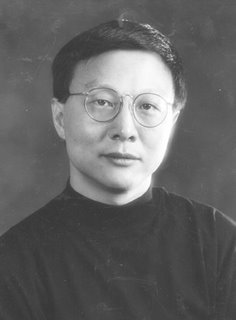Lin and Schub, Soaring over Three Continents
The Library of Congress concluded its 2005-2006 concert series on May 19 with an outstanding recital by Cho-Liang Lin and André-Michel Schub. Lin, Taiwan-born and Juilliard-trained, tours widely and has two Grammys under his belt; Schub, raised a New Yorker, studied at Princeton and the Curtis Institute and is active on the concert circuit, including these duo performances with Mr. Lin. Both men have a sense of adventure in programming; so in addition to two Mozart sonatas they presented a world premiere by Chinese-born American composer Bright Sheng, Three Fantasies for Violin and Piano, a Library commision; and William Walton's 1949 Violin Sonata.
| Available at Amazon: Stravinsky, Suite Italienne / Duo Concertant / Divertimento, Cho-Liang Lin and André-Michel Schub |
The other Mozart, the G major sonata, K. 379, is quite different: a brief adagio introduction led by the piano solo, the violin joining in then launching into a vigorous Allegro. The finale is a gentle theme-and-variations, including one for violin pizzicato, both imaginative and subtle -- a distinctive work beautifully performed.
W. Walton, Sonata for Violin and Piano / Piano Quartet, S. Orton, H. Milne, K. Sillito, R. Smissen |
 The Bright Sheng premiere concluded part one of the recital, and if the prospect of three movements based on dreams and central Asian folk-tunes sounds unpromising, think again. The sequence, Dream Song, Tibetan Air, and Kazakhstan Love Song, could have been the sort of East-meets-West-meets-social-realism that dominates too much music of Asian-American origin. Instead it sounded remarkably original and underivative, the brief Dream Song briefly summoning thoughts of Lou Harrison, the Tibetan Air hints of Henry Cowell's tone clusters, reference cues that quickly vanished from the mind as the music unfolded on its own right. In Tibetan Mr. Schub was asked to pound chords from opposite ends of the keyboard and sound a gong from the lowest notes with considerable weight on the pedal, in between producing bell-and-chime sounds across the spectrum. This, while Mr. Lin played a tortuous fantasy independent of the keyboard, yet still creating a unity from diverse parts. A touch of Carter (Elliott), almost. The Kazakh movement seemed the weakest of the three, but even here the song unfolded nicely, and plucked notes from the violin seemed to imitate random raindrops falling on water, a sound that moved to the piano under Mr. Lin's long held note to end the piece. New music I am eager to revisit: a rare occurrence that makes me want to hear more Sheng.
The Bright Sheng premiere concluded part one of the recital, and if the prospect of three movements based on dreams and central Asian folk-tunes sounds unpromising, think again. The sequence, Dream Song, Tibetan Air, and Kazakhstan Love Song, could have been the sort of East-meets-West-meets-social-realism that dominates too much music of Asian-American origin. Instead it sounded remarkably original and underivative, the brief Dream Song briefly summoning thoughts of Lou Harrison, the Tibetan Air hints of Henry Cowell's tone clusters, reference cues that quickly vanished from the mind as the music unfolded on its own right. In Tibetan Mr. Schub was asked to pound chords from opposite ends of the keyboard and sound a gong from the lowest notes with considerable weight on the pedal, in between producing bell-and-chime sounds across the spectrum. This, while Mr. Lin played a tortuous fantasy independent of the keyboard, yet still creating a unity from diverse parts. A touch of Carter (Elliott), almost. The Kazakh movement seemed the weakest of the three, but even here the song unfolded nicely, and plucked notes from the violin seemed to imitate random raindrops falling on water, a sound that moved to the piano under Mr. Lin's long held note to end the piece. New music I am eager to revisit: a rare occurrence that makes me want to hear more Sheng.A light apéritif, Ravel's Pièce en forme de habanera, nicely turned, was a suitable encore. One of the highlights of the LOC season.





















































No comments:
Post a Comment